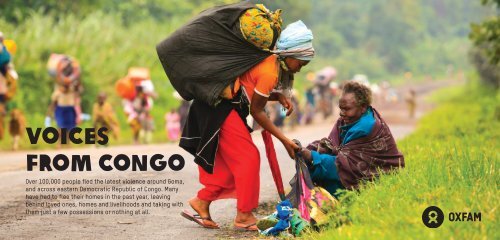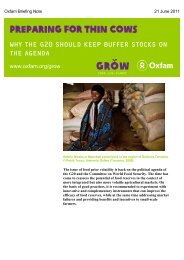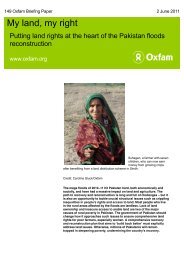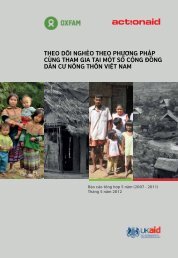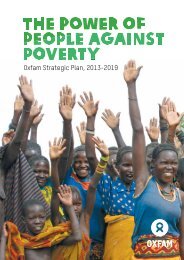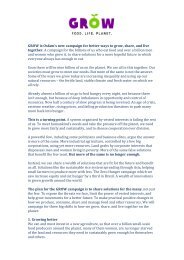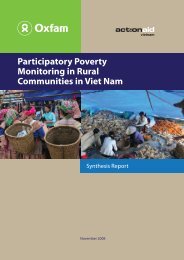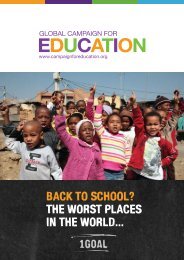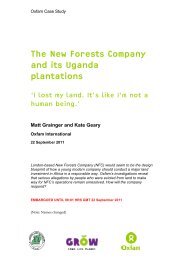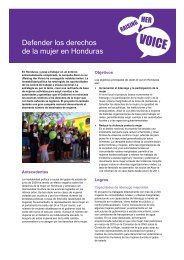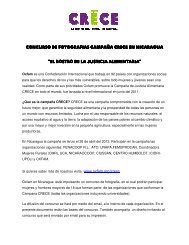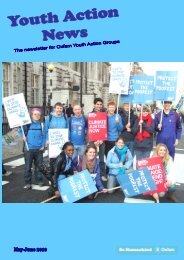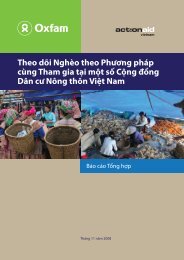Create successful ePaper yourself
Turn your PDF publications into a flip-book with our unique Google optimized e-Paper software.
<strong>Voices</strong><br />
<strong>from</strong> <strong>Congo</strong><br />
Over 100,000 people fled the latest violence around Goma,<br />
and across eastern Democratic Republic of <strong>Congo</strong>. Many<br />
have had to flee their homes in the past year, leaving<br />
behind loved ones, homes and livelihoods and taking with<br />
them just a few possessions or nothing at all.
Worsening crisis<br />
A surge in violence across eastern <strong>Congo</strong> has forced 750,000 people to flee their homes in the past year, as civilians face<br />
killings, forced recruitment, extortion and sexual violence at the hands of numerous armed groups and even the <strong>Congo</strong>lese<br />
security forces. In late 2012 the crisis deteriorated even further as the fighting reached Goma, the capital of North Kivu. At least<br />
140,000 people have been affected and are now sheltering in desperate conditions in camps in and around Goma. Many have<br />
been displaced two, three or even more times, trying to escape the conflict. People are in urgent need of clean water, healthcare,<br />
food, shelter and protection <strong>from</strong> violence.<br />
The situation<br />
The recent fighting around Goma has pushed one of the world’s biggest humanitarian crises over the edge, and the situation in<br />
eastern <strong>Congo</strong> is now worse than it has been for several years. However, the crisis in Goma is just the tip of the iceberg. Since<br />
April 2011, when the “M23” rebellion launched, the number and reach of armed groups has mushroomed. The government army<br />
pulled troops out of much of the east to focus on the rebellion and other armed groups took advantage of the security vacuum.<br />
At least 25 rebel groups are now active across North and South Kivu, attacking civilians and displacing hundreds of thousands<br />
of people. A recent <strong>Oxfam</strong> report found that civilians have become commodities of war and are forced to fund the war that<br />
devastates their lives – they not only face killings, rape and displacement, but are “taxed” and looted when farmers go to their<br />
fields and traders go to markets. People are going hungry in one of the most fertile regions of the world.<br />
People in North and South Kivu have lived for months with constant instability, and decades of conflict and marginalisation have<br />
eroded people’s ability to cope with crises. They are now faced with constant displacement as they search for safety. The most<br />
urgent needs now are to get humanitarian assistance to people affected by the conflict, and for ordinary people to be better<br />
protected by the <strong>Congo</strong>lese army and UN peacekeepers. But the underlying causes of conflict – such as poverty, the need for<br />
army reform, tensions over land and resources, and international responses that do not take local opinions and solutions into<br />
account – must also be addressed so that people can live in peace. DR <strong>Congo</strong> is the biggest country in sub-Saharan Africa and<br />
the crisis threatens to destabilise the entire region. It needs a long-term regional solution.<br />
Cover Photo: James Akena<br />
James Akena
Alain Wandimoyi<br />
Kakuru Hakiza, age 38, <strong>from</strong> Sake<br />
“<br />
There was a lot of fighting – I heard both loud<br />
guns and small guns. On that day I lost one of my<br />
sons, he was 12 years old. When we left,<br />
everyone was running everywhere. It was chaos.<br />
First we ran to Mubambiro and that was when we<br />
lost him. When we arrived someone told us that<br />
they had seen his body on the road, and that he<br />
was caught in an explosion. So we went to get<br />
him, and buried him there. Then we came to<br />
Lac Vert.<br />
”<br />
How many times have you had to leave<br />
your home?<br />
Three times<br />
What is the most precious thing you<br />
have lost?<br />
My son is the most precious thing that I have lost.<br />
What do you miss most?<br />
My home. I can never go home again.
Vo Vumiuya Bwira, age 45, <strong>from</strong> Kimoka, about 6km <strong>from</strong> Sake<br />
She has left her home 10 times as a result of conflict – the first time during the fighting with CNDP.<br />
Every time she comes to the Bulengo/Lac Vert area, and she is now sheltering in the church in<br />
Lac Vert.<br />
“<br />
We stay for a month or so, then we go home again for a few months and we can<br />
work in the fields. And then the fighting starts again, and we leave again. So that has<br />
become the rhythm of life. Most of the time we are surprised. There is no warning and<br />
we run with nothing. Sometimes in the morning or afternoon. We don’t have time to<br />
take anything with us.<br />
”<br />
What is the most precious thing you have lost?<br />
Really, it is a part of our life we lose every time we leave our homes. It’s like going to prison. Every<br />
time we leave is like a prison sentence and we lose everything – our possessions, our animals,<br />
everything. The most precious things we lose are members of our families – children, husbands. I<br />
lost my cousin. Gradually we are losing our lives. When we are home we are farmers and cultivate<br />
the land, but every time we leave we lose everything. At home if we need anything to eat, we go to<br />
our fields; if we need to buy anything we can sell the food we grow and get money. I miss the land<br />
because it is the land that allows us to live and to work. Most people in Masisi work as farmers<br />
and traders. But with the war we can’t do either and so we can’t give our families everything that<br />
they need. What we need most is peace.<br />
James Akena<br />
What are you most afraid of?<br />
We don’t understand what is happening. We want to go home, but it is difficult to keep<br />
restarting our lives. We don’t know who makes this war and why. But we lose everything.
Bernadette Nanzekuli, age 70<br />
<strong>from</strong> Kibumba<br />
Bernadette had been in Kanyaruchinya<br />
camp for two months before fleeing to<br />
Mugunga 1 camp as the fighting got closer.<br />
She now shelters in a classroom with her six<br />
children and grandchildren, and five other<br />
families. She will move to Bulengo when<br />
she can.<br />
“<br />
We saw men with guns in the camp<br />
(Kanyaruchinya), and they were firing.<br />
We were afraid, so we had to leave. We<br />
were running and it was hard with the<br />
children.<br />
”<br />
James Akena
Kate Holt/<strong>Oxfam</strong><br />
Dunia Sebayanda Boshab, age 24<br />
<strong>from</strong> Kimoka<br />
Dunia is alone in Lac Vert. He was separated <strong>from</strong> his wife and<br />
children on the day that fighting broke out in Sake. So far he<br />
has fled his home three times.<br />
“<br />
I was in the fields and my wife was at home with the<br />
children. When the fighting started I went to find her in<br />
the house, but she was already gone. I still don’t know<br />
where they are. I have asked around but I have not yet had<br />
an answer. When I was in the field I had my hoe and<br />
machete with me. But when I heard the fighting, I dropped<br />
them and I ran empty handed.<br />
”<br />
What is the most precious thing you have lost?<br />
I have lost two things, my wife and children…and my home,<br />
which was destroyed in the fighting.<br />
What do you miss most?<br />
First, I miss the land, and I miss my home. It has been destroyed.<br />
I have lost my work, and I have lost the tools with which I work<br />
What are you most afraid of?<br />
I am afraid of not being able to go back to the land. I am also afraid<br />
that this war is not yet finished. It could start again at any moment.
Batechi Shamamba, age 24,<br />
<strong>from</strong> Sake<br />
Batechi is currently staying with a host<br />
family until he can move into a shelter<br />
that he is building in Bulengo<br />
“<br />
We heard bombs and gunshots.<br />
We didn’t have time to take<br />
anything with us. There was fighting<br />
all around. All I have is what you see<br />
now. In the morning I go to the lake<br />
to wash and clean my clothes. Then<br />
I wait there until everything is dry.<br />
I have nothing else with me...not<br />
even a pot to cook with.<br />
”<br />
Kate Holt/<strong>Oxfam</strong>
Alain Wandimoyi<br />
Eddy Mbuyi, age 27<br />
<strong>from</strong> Goma<br />
“<br />
I’m 27 years old and I have rarely<br />
known life without conflict, suffering,<br />
hunger, violence and disease. My<br />
country has seen millions die in one of<br />
the deadliest conflicts since World War<br />
Two. This renewed conflict is different<br />
to the many I have experienced before.<br />
I am now a dad. I have a two-year old<br />
daughter to think about. I feel guilty.<br />
Guilty that I cannot put an end to this<br />
and guarantee a safe future for her and<br />
for all the innocent children who suffer<br />
because of the violence. It is with a<br />
heavy heart that I watch her when she<br />
plays war games with other children –<br />
because I know that their games are<br />
more real than they can imagine.<br />
I spend many nights wondering what<br />
her future will bring. Will she spend her<br />
entire life, like I have spent mine, living<br />
in a war zone? Will she ever see her<br />
country in a state of peace?”
<strong>Oxfam</strong> is assisting affected communities in DRC<br />
<strong>Oxfam</strong> teams have been scaling up our emergency response across eastern <strong>Congo</strong> for several months, as the conflict has worsened. We have further stepped-up work<br />
in response to the enormous humanitarian needs caused by the fighting in and around Goma since late 2012. In the Mugunga 1 and Lac Vert camps on the edge of<br />
Goma, and also at the Don Bosco site in the city itself, <strong>Oxfam</strong> trucks are delivering clean water and our teams are constructing new latrines to help prevent the spread<br />
of cholera, and a new more sustainable water system. We are also setting up water pumps for a new camp at Bulengo, which will help ease the overcrowding in the<br />
other camps. Our public health teams are working with committees in camps and children’s groups to raise awareness of how cholera is spread. In Lac Vert, which has<br />
seen a big influx of people in recent weeks, <strong>Oxfam</strong> teams have constructed 100 latrines, 90 showers, and are delivering 60,000 litres of safe water every day. <strong>Oxfam</strong><br />
also has ongoing programmes in other parts of North and South Kivu – in areas such as Beni, Mweso and Masisi – providing water, sanitation, cash so that people can<br />
buy food, and working with local communities to help them realise their rights in the absence of adequate protection <strong>from</strong> violence.<br />
Supporting refugees in Uganda<br />
About 30,000 refugees <strong>from</strong> DRC have fled across the border into southwest Uganda, and <strong>Oxfam</strong> launched an emergency response in the Rwamwanja refugee camp.<br />
<strong>Oxfam</strong> teams have drilled boreholes to provide people with a source of safe water, have constructed nearly 1,000 latrines to improve sanitation, and have carried out<br />
public health campaigns to prevent disease, and have helped people to gain an income and buy food. There are limited opportunities for people in camps to make a<br />
living, so <strong>Oxfam</strong> has provided “cash for work” whereby 8,000 families receive money for working to repair and improve the local roads. As well as generating income for<br />
refugees this will also benefit the local community who are hosting the influx of so many people. So far at least 18kms of road has been opened. <strong>Oxfam</strong> is also working<br />
with a local mobile phone company to provide unconditional cash transfers to help the most vulnerable families buy food.<br />
Supporting refugees in Rwanda<br />
About 20,000 refugees have fled DRC into Rwanda. They initially took shelter in Nkamira transit camp, close to the DRC border, where <strong>Oxfam</strong> built latrines, set up washing<br />
stations, supported health campaigns using drama and songs, and distributed sanitary kits and jerry cans. As the transit camp exceeded its capacity, refugees<br />
were then moved to a larger camp at Kigeme in the southwest of Rwanda, where <strong>Oxfam</strong> set up water and sanitation infrastructure – installing water tanks, pumps and<br />
tap-stands, and constructing latrines and showers – and trained hygiene groups to improve public health in the camp. After setting up infrastructure and supporting<br />
the initial influx of people, <strong>Oxfam</strong> has handed over most of our work in the camps to local partner organisations. However we continue to provide technical support and<br />
monitor the situation in case more people arrive.
Kate Holt/<strong>Oxfam</strong><br />
Together we can put an end to this crisis and<br />
change things for the better:<br />
• Regional change must work for the good of the people. As negotiations<br />
to end the conflict continue, the African Union needs to play a<br />
greater leadership role to ensure that the talks respond to the needs<br />
of the people affected by the violence.<br />
• This is a moment in time where previously made agreements must be<br />
honoured and even strengthened. The 2006 Pact on Security, Stability<br />
and Development is a deal that would help deliver peace, and the<br />
AU should push for its implementation. Any other deals made should<br />
strengthen the existing Pact rather than start afresh<br />
• The people of eastern DRC - who have suffered most <strong>from</strong> the crisis<br />
and have most at stake in its resolution - must be given the opportunity<br />
to help bring positive changes. The National Consultation<br />
Process recently announced by the DRC government, is a welcome<br />
step forward and should be prioritised<br />
For more information contact:<br />
Desire Assogbavi <br />
Brenda Mofya <br />
http://www.oxfam.org/en/drc-conflict<br />
Follow us on twitter @<strong>Oxfam</strong>EAfrica


